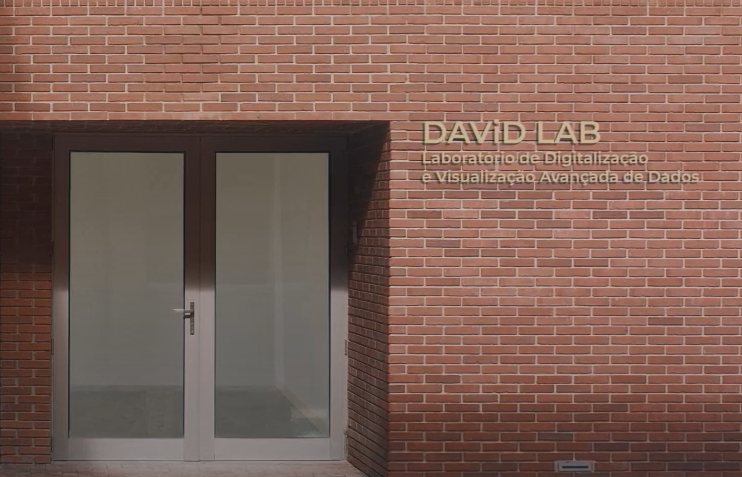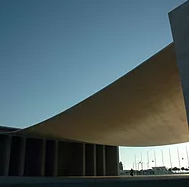LABORATÓRIO DE DIGITALIZAÇÃO E VISUALIZAÇÃO AVANÇADA DE DADOS (DAViDLab)
Coordenadora Global
Criação de um Laboratório de Digitalização e Visualização Avançada de Dados (DAViD Lab), uma infraestrutura única no contexto nacional e regional, que se enquadra na prioridade de investimento 1A - Competitividade e Inovação do Aviso Lisboa2030-2024-36. o DAViD Lab permitirá a igitalização multidimensional de arquivos históricos, culturais e científicos de elevado valor patrimonial, promovendo a preservação e acessibilidade de documentos e objetos. Esta infraestrutura será equipada com tecnologias avançadas de digitalização e curadoria de dados, incluindo soluções interativas e colaborativas baseadas em ferramentas digitais e inteligência artificial.
Informação do Projeto
2025-02-25
2027-08-25
Parceiros do Projeto
- Iscte-CI - Líder
- BRU-Iscte - Coordenador Técnico
- CEI-Iscte
- CIES-Iscte
- CIS-Iscte
- DINAMIA'CET-Iscte - Coordenador Técnico
- CRIA-Iscte
- IT-Iscte - Coordenador Técnico
- ISTAR-Iscte - Coordenador Técnico
- IMT - (Portugal)
- CML - (Portugal)
- ICOMOS-PT - (Portugal)
- EPHEMERA - (Portugal)
Aprendendo com o passado: a importância da antiga produção habitacional participativa para os próximos anos
Coordenadora Global
A arquitetura social participativa tornou-se parte integrante da disciplina a partir do final dos anos 1950. Vários arquitetos e teóricos (Giancarlo de Carlo, Colin Ward, J.F.C. Turner, mais tarde N.J. Habraken) experimentaram diferentes tipos de relacionamento cliente-arquiteto e teorizaram uma compreensão diferente da própria arquitetura, com maior ênfase no processo do que apenas nos resultados - e foco na 'habitação como um verbo', que Turner introduziu retrospetivamente em 1972. Em resposta às grandes manifestações públicas na sequência da 'Revolução dos Cravos' portuguesa de 25 de Abril de 1974, foi criado o Serviço Ambulatório de Apoio Local (SAAL) pelo Ministério da Habitação, Ação Social e Ambiente. Com o objetivo de responder à necessidade urgente de novas habitações para as comunidades desfavorecidas no Portugal urbano, o Serviço foi modelado em torno de uma equipa de especialistas, conhecida como Brigadas. Eles deveriam apoiar os comitês de moradores, facilitando projetos habitacionais que fossem concebidos com as comunidades locais, em vez de serem impostos de cima. O programa envolveu 170 projetos em todo o país, envolvendo na sua maioria arquitetos da 4ª geração de arquitetos modernos portugueses (4-GPMA). Através de uma abordagem histórica, social e cultural, o objetivo desta investigação é analisar e ilustrar a evolução da arquitetura participativa em Portugal e a sua relação com o pensamento crítico e as práticas internacionais. Abordar a questão do que podemos aprender com esta experiência criativa e socialmente engajada face à dramática crise habitacional que Portugal enfrenta atualmente. Esta pesquisa traça o surgimento da arquitetura social participativa em Portugal, focando especialmente no trabalho da 4ª geração de arquitetos modernos portugueses (4GPMA) em relação à questão da habitação em Portugal pós-1974. É este o contexto que esta investigação pretende explorar, centrando-se particularmente como estudo de caso na obra de RHF, arquiteto q...
Informação do Projeto
2022-04-01
2028-03-31
Parceiros do Projeto
A monumentalidade crítica de Álvaro Siza: Projetos de Renovação Urbana depois da Exposição internacional de Lisboa de 1998
Investigadora
O projeto de investigação ‘A Monumentalidade Crítica de Álvaro Siza – Projetos de Renovação Urbana depois da Exposição Internacional de Lisboa de 1998 (Expo’98)’ pretende identificar, caracterizar, discutir e refletir sobre os projetos de Álvaro Siza dentro do contexto das políticas urbanas lançadas no princípio do século XXI. O projeto possui como ponto de partida a análise da obra do Pavilhão de Portugal no contexto do projeto de renovação urbana que o evento Exposição Internacional de Lisboa proporcionou. O Pavilhão, concebido sem uma específica atribuição de programa para além do programa temporário de edifício representante de Portugal na Expo’98, é atualmente tido como um laboratório da arquitetura de Álvaro Siza e um projeto de referência dentro da Cultura Arquitetónica Portuguesa. Neste sentido considera-se indispensável um trabalho interpretativo e analítico possível de mapear e qualificar as suas qualidades e conceitos.
Operações arquitetónicas e urbanísticas depois da Exposição Internacional de Lisboa de 1998
Investigadora
O projeto de investigação 'Grandes Trabalhos - Operações arquitetónicas e urbanísticas depois da Exposição Internacional de Lisboa de 1998', tem o intuito de identificar, caracterizar, debater e refletir sobre as políticas urbanas e a arquitetura produzidas em Portugal após a Exposição Internacional de 1998, em Lisboa (Expo98). O estudo assenta na convicção de que os reflexos daquele 'laboratório urbano' não podem prescindir de um trabalho de natureza predominantemente analítica e interpretativa, capaz de mapear e qualificar a cultura urbanística, projetual e tecnológica implementada em Portugal nas duas décadas que se seguiram aos projetos da Expo98. Em 2008, passada a primeira década desde a Exposição de Lisboa, foi apresentado pela Câmara Municipal de Lisboa o Plano Geral de Intervenções da Frente Ribeirinha (PGIFR), com o intuído de estabelecer continuidades urbanas, alargando o modelo do Parque das Nações a todo o aterro marginal da cidade, entre o Rio Trancão e a doca de Pedrouços, reconfigurando algumas das áreas de infraestruturas portuárias que se encontravam sob a administração pública do Estado. A dinâmica gerada pelo PGIFR tem permitido enquadrar projetos de grande dimensão e importância estratégica para o país, tais como: a Fundação Champalimaud, na zona da doca de Pedrouços a Ocidental do município, com projeto do arquiteto Charles Correa (1930-2015); o Museu Nacional dos Coches, na zona de Belém, desenhado por Paulo Mendes da Rocha (n. 1928); a sede da EDP de Manuel (n. 1963) e Francisco (n.1964) Aires Mateus no aterro da Boavista; a reabilitação do espaço público da Ribeira das Naus, com projeto de João Ferreira Nunes (n.1960) e João Gomes da Silva (n.1962); ou o futuro Terminal de Cruzeiros em Santa Apolónia, com desenho de Carrilho da Graça (n.1952), agora em construção. O projeto 'Os Grandes Trabalhos - Operações arquitetónicas e urbanísticas depois da Exposição Internacional de Lisboa de 1998' procura aprofundar as relações produzidas pelas inter...
Informação do Projeto
2018-10-01
2022-09-30
Parceiros do Projeto
- DINAMIA'CET-Iscte (CT) - Líder
Alexandra Saraiva - Projeto de Pós-Doc
Coordenadora Global
O projeto de pós-doutoramento intitulado “A monumentalidade revisitada - Hestnes Ferreira, entre intemporalidade europeia e classicismo norte americano (1960-1974)” visa reconstruir os contactos, as influências e as relações de Hestnes Ferreira, procurando entender, o impacto nas suas obras, fruto do intercâmbio entre a Europa e os Estados Unidos, no período inicial da sua atividade de arquiteto, entre 1960 e 1974, altura em que projeta o conjunto SAAL da Quinta da Fonsecas. A investigação teve como principal contributo, compreender a arquitetura do Raúl Hestnes Ferreira, viajando pela constante triangulação entre a arquitetura mediterrânica, escandinava e a obra de Louis Kahn, na procura da essencialidade da arquitetura, cruzando esta triangulação com o universo neorrealista de seu pai, José Gomes Ferreira. O trabalho de investigação iniciou no atelier do arquiteto Hestnes Ferreira no Largo da Graça, em Lisboa e contou com o seu apoio. Inicialmente, excluía quarenta e quatro anos do espólio deste arquiteto, de 1974 a 2018. Contudo, após o seu falecimento em 2018 foi solicitado e aceite pela FCT estender a investigação a totalidade do espólio do arquiteto. Com base em fontes primárias, incluindo a documentação original do acervo, mas também na análise qualitativa de diversas entrevistas e depoimentos orais do arquiteto e de antigos colaboradores, este projeto de pós-doutoramento pretendeu enquadrar a prática profissional deste arquiteto bem como a sua relevância para a História e Teoria da arquitetura portuguesa e no mundo.
Informação do Projeto
2015-11-01
2022-03-31
Parceiros do Projeto

 English
English




